Self-evaluation for Self and School Improvement: The Development of a Self-Evaluation Strategy Enabling All Staff to Engage with Consistency and Rigour, Bringing a Genuine Basis for Self and School Improvement
DOI:
https://doi.org/10.36399/72d8a296Keywords:
self-evaluation, self-improvement, school improvement, strategic change initiative (SCI), structured frameworkAbstract
The National Improvement Framework (NIF)[1] (Scottish Government, 2023) sets out a clear vision for Scottish education based on delivering excellence and equity. Two of the six key drivers identified as being critical for ensuring both individual pupil achievement and whole school improvement are the quality of teaching and the quality of leadership in schools. (Mincu, 2015). Through the researcher’s personal school experience, backed by an understanding of professional literature (Hopkins, 2001) it is clear that a central factor for sustaining change that genuinely achieves teacher and school improvement is a consistent approach to self-evaluation. Effective self-evaluation is fundamental for both the professional development of individual teachers and the improvement of schools (MacBeath & McGlynn, 2002). Recognising this fundamental element of school excellence and coupled with the clear mandate for all staff to engage in self-evaluation (GTCS, 2021) this article outlines a strategic change initiative (SCI)[2] which sought to develop a strategy to enable all staff to engage in self-evaluation with consistency and rigour, bringing a genuine basis for self and school improvement. At an individual level, critical competence in a teacher’s role is being able to scrutinise their own abilities against the requirements outlined in the General Teaching Council Scotland (GTCS) professional standards (2021)[3], making evidence-based judgements on what to develop. To deliver this effectively, self-evaluation needs to be part of a structured framework and established in school practice. Furthermore, assessment needs to lead to action to ensure improvement happens (Stoll, 2009), making evidence-based judgements on how to develop. Overall, development of a structured, timetabled framework for effective self-evaluation provides the basis for meaningful school improvement that delivers for young people.
[1] The National Improvement Framework (NIF) summarises the vision and priorities for Scottish education that have been agreed across the system, and the national improvement activity that needs to be undertaken to help deliver those key priorities.
[2] The Strategic Change Initiative (SCI) is the process undertaken by participants of the National Into Headship programme in Scotland to develop strategic leadership for change.
[3] The GTCS Standard for Full Registration is the benchmark of competence required of all registered teachers in Scotland. This Professional Standard encompasses what it is to be a teacher in Scotland.





